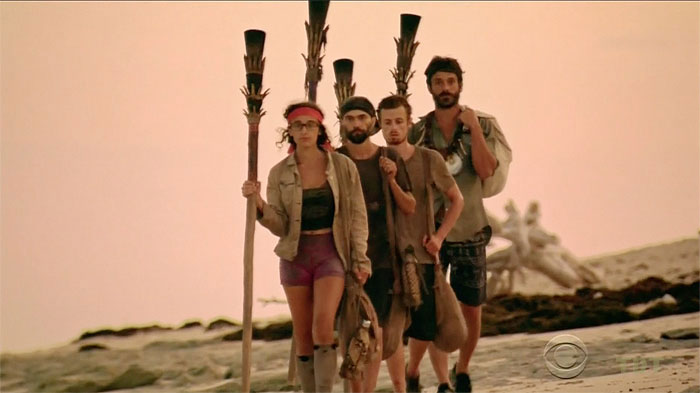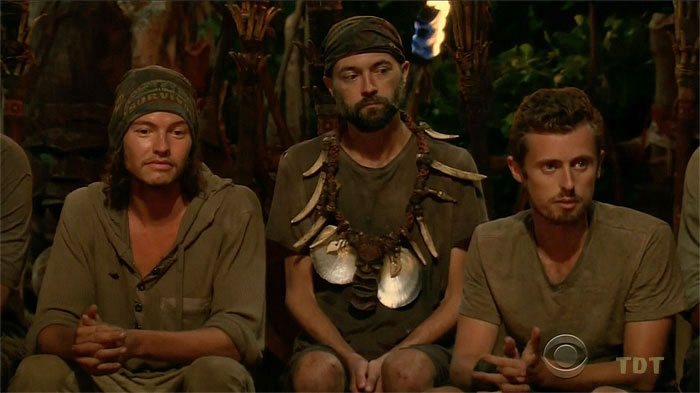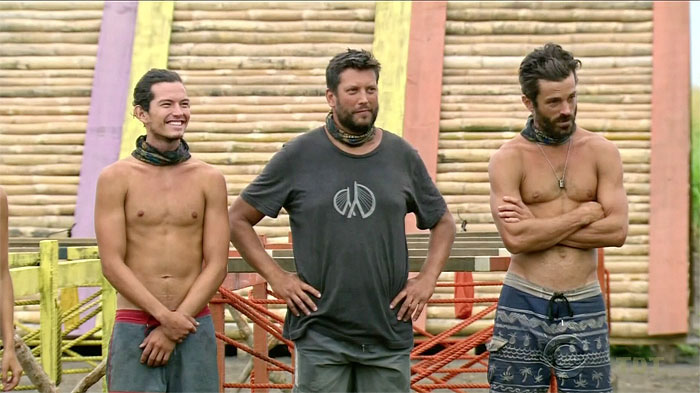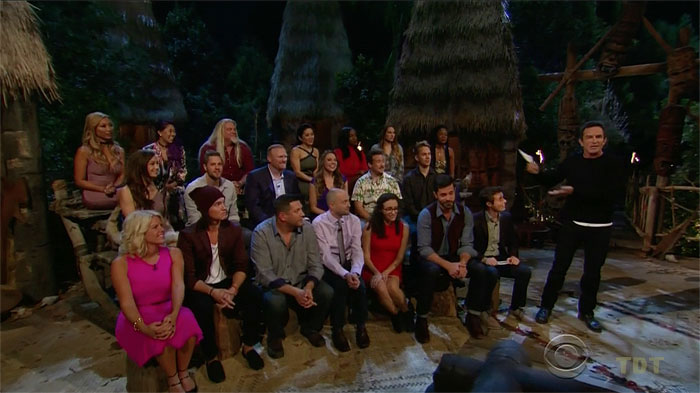

As Millennials vs. Gen X came to its bittersweet end, everything did come up Adam, after all: Ten jury votes; the Final Three of his choice; and, of course, the million-dollar prize. It was a satisfying win, and yet one also suffused with sadness, as Adam led the entire audience in weeping openly about the painful irony of realizing his dream of grasping the pinnacle of Survivor success just days before also realizing the nightmare of having his mother (and almost-San Juan del Sur castmate) taken away from him by lung cancer. One more reminder that, even in a season where so many players had great attitudes about the cutthroat nature of Survivor and it being just a game, its players are still real people with real lives.
Some critics have argued that Adam's victory was somehow unearned, or that the emotion of the moment swayed the jury. That seems unlikely. He played a solid game: He recovered from being on the wrong side of the numbers in his first vote of the season, built a solid cross-tribal alliance at the swap, helped obvious leaders like Chris and Zeke take other out in the early post-merge, then eliminated his three biggest jury threats in the finale, all while finding and playing a couple of idols, a brand-new advantage, and winning an immunity challenge. Best yet, he made his jockeying for position with the endgame power players (Jay and David) highly public, so that their ousters were seen as his successes. It didn't hurt that the jurors didn't much care (rightly or wrongly) for his two Final Three opponents. It wasn't a flawless game, but he did exactly what he needed to win, with or without news from home.
And win he did, tying Jeremy Collins for the most jury votes ever received. Furthermore, he played perhaps the most successful (relative to his opponents) social game, ever: Using our Performance Above Expected metric (PAE), Adam quadrupled his projected jury vote haul, going from 2.5 votes to 10, for a +75% improvement. (Ken simultaneously snatched the greatest Performance Below Expected away from Woo Hwang, with -55%.) In a lot of ways, Adam's game was the one Todd Herzog intended to play in China, with Ken as his Aaron and Jessica (then Hannah) as his Amanda. And Adam's win was satisfying for a lot of the same reasons: A young super (duper) fan finally gets to play the game he loves, and comes out on top. Adam played a rational, calculating game, but he was not just a gamebot. He was a gamebot with a heart. And that's probably what tipped the scales so heavily in his favor.
If you wish to donate to Stand Up To Cancer, here's the form for doing so (matching donations up to a total of $100,000 from Bristol-Myers Squibb through December 31, 2016): "Honor my mom, Susie."
The jury vs. Hannah and Ken

After listening to their exit interviews, it's disappointing Ken and Hannah weren't better appreciated for the games they played, both by the jury and by the show itself (the latter particularly in Hannah's case). Both grew tremendously over the course of the season, and both also had hidden gameplay that was either cut by the editors or ignored by the jury.
Ken's interviews were perhaps the most surprising. Depicted by tribemates and the show alike as an aloof, loyal, non-strategist, Ken revealed some surprising strategic chops that did not make the air. Aware that physical threats were targeted in the early post-merge, he told Josh Wigler he fashioned a Tyson-esque sling to play up "old football injuries" to Taylor and Jay. This level of sophistication was occasionally present in the show itself. While his "testing" of Will was presented (accurately) as a headscratcher, a few episodes earlier when David wanted to target Chris, Ken showed great insight in questioning whether it was a good idea to include Chris's buddy Zeke in the plan. Sure, Ken probably did spend more time than he should catching and preparing fish, but there was more game there than we were shown. And he made his most important move when it counted the most: ensuring David did not reach the Final Three, which guaranteed Ken at least had a shot at the million.
In Hannah's case, she made a solid case for herself at the Final Tribal Council, perhaps even better than Adam's, but the jurors seemed completely unwilling to consider her arguments. This is probably partially because the jurors had already decided to vote for Adam based on their time in the game, and were unlikely to be swayed by too-late explanations. Which is reasonable, but exposes the common misperception that jury votes are ever really in play, especially for someone whose strategy involved a lot of surprise rogue votes. Playing in the shadows when others are flashing idols and rallying troops is perfectly acceptable, but it's unlikely to attract attention and respect from a group of people intent on rewarding more out-front gameplay.
Hannah correctly identified to Josh Wigler that people probably resented her turning on them because she formed deeper connections with them than some of the more aloof players, much in the way the Caramoan jury praised Cochran while lambasting Dawn for making the exact same moves. Additionally, Hannah's strategic game didn't really start until after the merge. So someone like Michelle, who had an undershown friendship with Hannah, had only personally witnessed having to talk Hannah into voting for Mari in Ep.2, then hearing about how Hannah had been out of the loop entirely on the Michaela boot. Later in the game, Hannah was a surprising target a couple of times, but one time Zeke talked his troops into going to rocks, and the next time, both Adam's idol and Will's flip saved her from being at any actual risk. (It probably didn't help her case with Jessica when Hannah took credit for "putting every one of you on the jury," either.) Furthermore, as with Ken, Hannah was partially hiding behind a facade, intentionally playing up the nerdy/quirky aspects of her personality to appear less threatening (as she told Rob Cesternino). Compared to a visible strategist like Adam, stealthy players Hannah and Ken had an uphill battle to convince the jurors they'd even done anything, let alone controlled the game. Still, as Andy Dehnart noted in his recap, that doesn't excuse the show from reducing Hannah's reunion coverage to swooning for Ken.
To be fair, Adam really did play a demonstrably good game, and outplayed Ken and Hannah, built strong relationships with the jurors, and made highly visible moves in front of the jury. Each individual juror could easily justify casting their ballot for Adam, and that's why he won. But in a world where Missy Payne and Jaclyn Schultz both avoided joining the Zero Votes Club, and in a season with a 10-juror pool, it's still a shame that neither Ken nor Hannah received a single vote. Adam's victory would have been just as well-earned at 8-1-1.
David and Jay for the (future) win

Thanks to Adam's (correct) gameplay, we the audience missed out on the dream Final Three of David, Jay, and Adam. But the former two each made an enormous impact on the season, and on the finale itself, especially during the final six Tribal Council, where Jay's luck finally ran out. Falling wholesale for David's masterful fake idol ruse, Jay was blindsided 5-[0] (after Ken played the Legacy Advantage, which ended up being just a hidden idol with no actual idol, and instead just a note). But wow, what an exit. Jay's unique mix of bewilderment and glee at being taken out in such a spectacular fashion made this one of the best Tribal Councils, ever. Future contestants can only hope to react to their elimination as delightfully as Jay did. As we said at the time, "Dear #Survivor: Please cast more Jays."
Taking out Jay was the right move for everyone left, but it still stung a bit. Taking out David was the right move for each person in the Final Three, and that also hurt. So maybe our initial projections for these two were just a teensy bit off (especially Jay, whom we pegged as clueless and third-to-last in likelihood to win). We've never been more delighted to be so, so wrong. We should probably mourn more completely that neither made it to the finals, and that likewise, neither was deemed worthy of being a "Game Changer" (while Brad Culpepper was), but we're fine with that. Both David and Jay will benefit from recovering physically and being able to watch this season air on TV before playing again, and these two seem like absolute locks to play again sometime. In these grim times, it's nice to have at least something to look forward to, no?
Numbers alert: The rise of the the non-VFB player

Once upon a time, voting people out was the key component to winning Survivor. Is that still true? We've had a lot of fun with the non-VFB (not voting for the person booted) single-season leaderboard, but maybe it's time we started taking it more seriously. Two of the top four performances ever were this season (Bret with 8, Jay with 7). Five of the top six were in the past five seasons. And the one person not included in that group, all-time leader Eddie Fox (with 9), only appeared as far back as Caramoan. As rigid alliance voting has fallen by the wayside, rogue voting has seemingly increased. What's important about this development is that a lot of these players (Keith in SJdS, definitely Jay here, possibly also Bret and Rodney) could have won the game if they'd just made it to the finals. That's an underappreciated, potentially massive change to the game, should someone choose to take advantage of it.
Getting to the end with no blood on your hands could be a bold new strategic play. Technically, it's what Fabio did, quasi-intentionally, in Nicaragua. It's what Ozzy almost did (with a huge boost from Redemption Island) in South Pacific. Is the time ripe for someone to go all-in on this strategy? Should we call it the Intentional Gervase? The Intentional Eddie? A string of episodes full of currying favor with the person about to go out, and throwing away a vote in a knowingly futile attempt to save them? Could that even have been Bret's strategy here? (The audience was never really privy to his strategic game, beyond not getting booted when he did.) We're certainly not asserting that everyone (or even anyone, necessarily) on this leaderboard was doing that, but we are suggesting that maybe someone should try it.
One (or more) final (set of) word(s)

Since we've criticized recent intrusions of irrelevant fluff into the reunion show, praise where it's due: This season's reunion correctly kept the focus where it deserved to be, on the contestants. No chatting with Probst's buddy, Sia, no cuts to Boston Rob or Rudy Boesch or Mayim Bialik. Sure, the pre-jurors were pretty much ignored, except Figgy (for obvious reasons) and Michaela. But the rest of the time was spent on the people most responsible for making this season great.
This was a tremendous cast, especially the jurors and final three. This is a testament to Casting's ability to find and put forth people who actually know and respect the game. People who don't wake up on Day 33 with the shocking realization that the show involves voting people out, or that people they like (and/or who like them) may turn against them. People who know that it's not about "making Big Moves," but that it is about embracing moves when they make sense, and playing to win.
This cast did all that, and resolutely avoided the interpersonal nastiness that has afflicted other recent seasons (Worlds Apart and to a much lesser extent, Kaoh Rong). That positive spirit contributed mightily to making this a fun season to watch. Even despite the early emphasis on the grating theme. This cast played their way past that, and made Millennials vs. Gen X a triumph all around. Thank you.
S33: MvGX Episode 14 recaps and commentary
- Gordon Holmes at XfinityTV.com: "And the Winner Is..."
- Dalton Ross at EW.com: "I'm Going for a Million Bucks" (recap)
- Dalton Ross & Jeff Probst at EW.com (Q&A)
- Andy Dehnart at Reality Blurred: "Survivor: Millennials vs. Gen X ends with highs and lows"
- Stephen Fishbach at People.com: "A Roller Coaster Ride of Victories and Stumbles"
- Martin Holmes at YahooTV: "An Emotional Ending"
Exit interviews: Adam Klein (winner)
- Gordon Holmes at XfinityTV.com (12/15/16): "Adam: Jay is the 'Batman to My Joker'"
- Josh Wigler at Parade.com (12/15/16): "Adam Klein Explains His 'Hyper Focused' Path to Victory"
- Rob Cesternino at RHAP (12/15/16): "Finale Top 6 Interviews with Kim Spradlin"
- Dalton Ross at EW.com (12/15/16): "Adam talks about the show's most emotional finish ever"
Exit interviews: Ken McNickle (2nd place)
- Josh Wigler at Parade.com (12/15/16): "Ken McNickle Opens Up About His Fate in the Game"
- Rob Cesternino at RHAP (12/15/16): "Finale Top 6 Interviews with Kim Spradlin"
Exit interviews: Hannah Shapiro (2nd place)
- Gordon Holmes at XfinityTV.com (12/15/16): "Hannah: 'I Thought Being a Strong Woman Like Jessica Would Get Me Targeted'"
- Josh Wigler at Parade.com (12/15/16): "Hannah Shapiro on the Power of Being Bold"
- Rob Cesternino at RHAP (12/15/16): "Finale Top 6 Interviews with Kim Spradlin"
- Dalton Ross at EW.com (12/15/16): "Hannah on the 'huge mistake' she made (Hint: It's not what you think)"
Exit interviews: David Wright (4th place)
- Gordon Holmes at XfinityTV.com (12/15/16): "Castaway Interview with David, Bret, and Jay"
- Josh Wigler at Parade.com (12/15/16): "How David Wright Went from Nervous Wreck to Massive Threat"
- Rob Cesternino at RHAP (12/15/16): "Finale Top 6 Interviews with Kim Spradlin"
- Dalton Ross at EW.com (12/15/16): "David on why he's happy he didn't win"
Exit interviews: Bret LaBelle (5th place)
- Gordon Holmes at XfinityTV.com (12/15/16): "Castaway Interview with David, Bret, and Jay"
- Rob Cesternino at RHAP (12/15/16): "Finale Top 6 Interviews with Kim Spradlin"
- Dalton Ross at EW.com (12/15/16): "Bret takes us inside the moment of the season"
Exit interviews: Jay Starrett (6th place)
- Gordon Holmes at XfinityTV.com (12/15/16): "Castaway Interview with David, Bret, and Jay"
- Josh Wigler at Parade.com (12/15/16): "Jay Starrett Relives His Glorious Downfall"
- Rob Cesternino at RHAP (12/15/16): "Finale Top 6 Interviews with Kim Spradlin"
- Dalton Ross at EW.com (12/15/16): "Jay reflects on falling for the fake hidden immunity idol"
 Jeff Pitman is the founder of the True Dork Times, and probably should find better things to write about than Survivor. So far he hasn't, though. He's also responsible for the Survivometer, calendar, boxscores, and contestant pages, so if you want to complain about those, do so in the comments, or on Bluesky: @truedorktimes
Jeff Pitman is the founder of the True Dork Times, and probably should find better things to write about than Survivor. So far he hasn't, though. He's also responsible for the Survivometer, calendar, boxscores, and contestant pages, so if you want to complain about those, do so in the comments, or on Bluesky: @truedorktimes
- Recaps index
- Cast projections
- Ep.1: A Whirlwind of windbags
- Ep.2: Love and doctors
- Ep.3: Summit of groans
- Ep.4: The Wright move
- Ep.5: Three strikes
- Ep.6: Free of shipping
- Game 7: The Cubs, stats, and Survivor
- Ep.7: Smoked by Jay
- Ep.8: The Millennials find their goat
- Ep.9: Game changers?
- Eps.10-11: Wasted opportunity
- Ep.12: From Adam to Zeke
- Ep.13: Fun, painful, beautiful, amazing
- Pre-Ep.14: Jury jeopardy
- Ep.14: Adam's evening